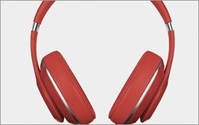 Music cannot possibly be overstated for its power as a social adhesive, stimulant, intellectual laxative (however you define that), tranquilizer, sedative, universal communications medium, and, of
course, conduit to consumers.
Music cannot possibly be overstated for its power as a social adhesive, stimulant, intellectual laxative (however you define that), tranquilizer, sedative, universal communications medium, and, of
course, conduit to consumers.
Especially young consumers, who spend every moment of their lives, including perhaps sleeping moments, in a “Beats By Dr. Dre” mind
meld: they are listening for free, sharing it, mixing it, mocking it, and making it.
MediaVest has completed a comprehensive study on this, based on one-on-one interviews with
over 2,000 consumers, discussion groups, and ethnographic research in eight markets. And it has learned what most of us probably know intuitively: it’s free as air and knows no boundaries,
whether they be national, cultural, or categorical (music is now fashion, merchandise, sports, and social media) and everyone wants to listen to everything at least once and them share it.
advertisement
advertisement
The report, "Hyper Music Millennials - Marketing and Meaning," also says there’s a downside: free things are undervalued. And Millennials are overwhelmed by the sheer volume of
“free.” Its sheer quantity debases the perception of its quality.
On the other hand, because of access and mobility afforded by the cloud and the phone as a
conduit, Millennials are driven by ephemeral, quick immersions in music, and they have developed a taste for variety and novelty. "Old-world music was tribal: you had CDs and records and two or three
different genres of music you followed," says David Shiffman, EVP of research at MediaVest. He tells Marketing Daily that Millennials want access to a broad body of music. "They want new music,
and they have grown up with that expectation; it has always been the case, so it's expected. And because cultures and generations have blended, they are coming from a bigger global mindset that says,
'I don't want to be defined just one way. There's no reason for me to be isolate myself in one camp.’"
Because music has become intangible and vaporous, there is also a
movement toward physical experience: the study reports that vinyl sales were up 33% in 2013 and that concerts are booming: LiveNation concert sales were $4.5 billion last year, up 17% versus
2012.
In any case, Millennials think marketers are missing the mark. Clearly, plastering ads on music -- rather than extending their own brand value and experience within it
-- won’t work. Says Shiffman: "If you listen [to Millennials] you are finding out what the opportunities are and what [listeners] want. It's about creating something around need, in a way that
contributes to the experience. It's facilitating, making the experience better by helping you do what you want to do."
The study also says Millennials have a strong point of
view and brands need to mirror that in what they do, and they have to be transparent about why they are doing it and how they are adding value. Shiffman points out that commitment is key as well. He
says Honda’s new Honda Stage program gets it right. "Honda has
put the stake in the ground around being a facilitator of music and music culture," he says. “It's incredibly multi-dimensional. It wasn't imagined as a one-off. So if you are going to spend big
money try to find a way to do it in a unique way."